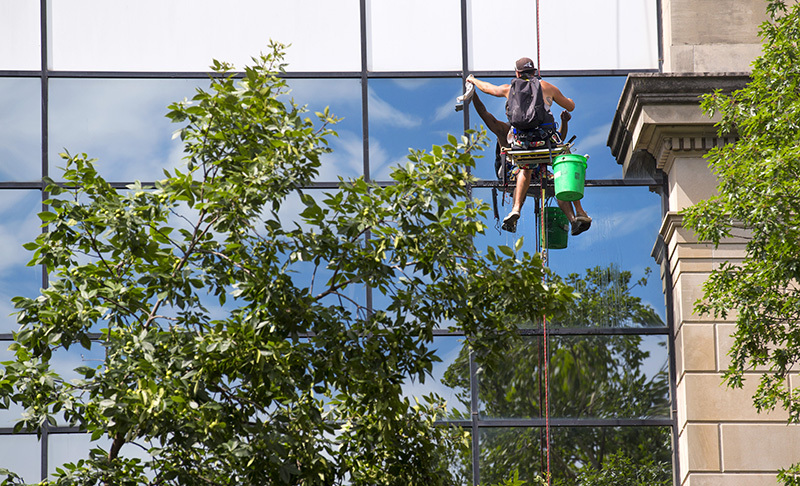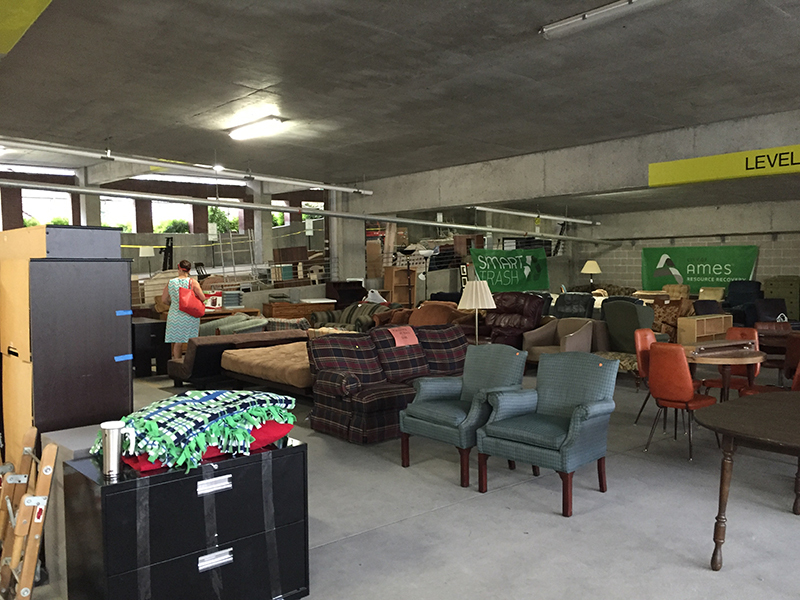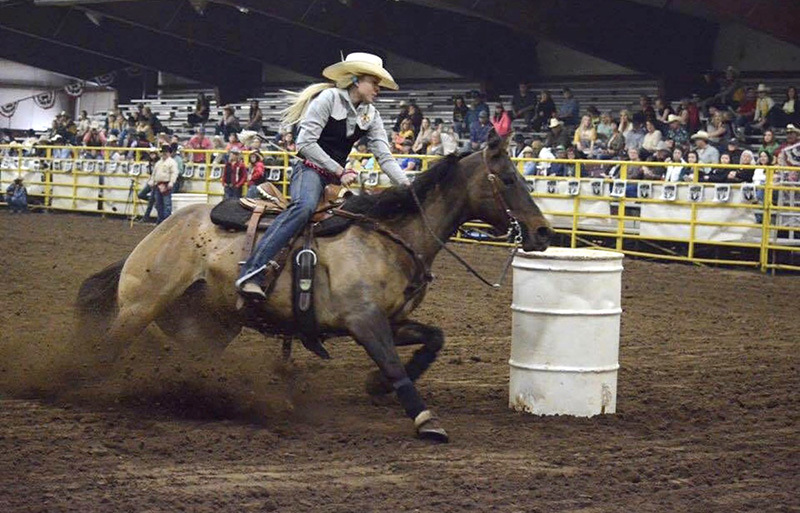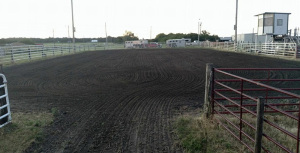Polishing Parks

Photo by Christopher Gannon.
A window washer polishes the corner of a window high on the facade of Parks Library on Tuesday.
Universities asked to prepare five-year tuition proposals for regents' task force
The state Board of Regents' tuition task force has scheduled meetings this summer with five stakeholder groups, including Iowa's three regent universities. All sessions are open to the public; audio of each also will be livestreamed on the board's website.
Recommended this spring by outgoing board president Bruce Rastetter and picked up by new board president Michael Richards, the four-member task force is charged with leading a discussion on funding public higher education in Iowa, including issues that play into the process of setting tuition rates for the three public universities. The intent is to make tuition rates more predictable for students and their families and less reactionary from year to year. For the last two years, the board adjusted fall tuition rates just months before the semester began. Iowa State experienced cuts to its state appropriations in both FY17 and FY18.
Regent Larry McKibben, who chairs the task force, said "that's a bad way to do business."
He went on to explain it's unrealistic to expect three large universities to operate without annual revenue increases. Additionally, he expects the budgeting process to be proactive, not reactive.
"We have to do better," McKibben said. "I want the students of Iowa to have the highest quality of education we can give them, but they -- and the citizens of Iowa -- need some understanding of what [a university education] is going to cost them."
Joining McKibben on the task force are regents Milt Dakovich (vice chair), Sherry Bates and Nancy Boettger.
Submit your comments
- In person: Aug. 9, noon-1 p.m., 240 Scheman
- Online: by Aug. 31
The task force has requested time with two broad stakeholder groups: legislative/state government representatives, and business, workforce development, and economic development representatives. Both of those presentations are scheduled for July 27.
Five-year tuition plan
Each of the three universities will present a five-year tuition proposal at its session with the task force. Iowa State's presentation is scheduled for Aug. 9.
"Scaling the university to accommodate rapid enrollment growth and ensuring progress on Iowa State’s strategic plan are guiding the development of the proposal," said chief financial officer Miles Lackey. "Investments that support our students and advance our strategic priorities are essential in order for us to continue fulfilling our land-grant responsibilities."
The process of developing Iowa State's tuition proposal is being led by the president's budget cabinet, with input from student leaders and shared governance groups, including the university budget advisory committee, president's cabinet, senior vice president leadership teams, and others. Budget planners have conducted many work sessions this month to listen, pose questions, and collect ideas and data that will shape a long-term tuition proposal.
Campus listening sessions
The task force's campus visits also will include an open listening hour (noon-1 p.m.), during which members of the public may address the task force on the topic of tuition. McKibben said task force members are anxious to hear what students and families have to say. Comments may be submitted to the task force via its website as well.
Noting that the discussion on tuition never actually stops, McKibben said he is hopeful that this task force's work wraps up in time to submit a final report to the full board at its Sept. 7 meeting. The board's current practice is to receive tuition proposals from the universities in October for the following fall, and approve rates at its December meeting.
Meeting schedule: Tuition task force
Thursday, July 27, Pappajohn Education Center, 1200 Grand Ave., Des Moines
- 9 a.m.-noon, Legislative and state government representatives
- 1-4 p.m., Business and economic development associations and state agencies
Monday, Aug. 7, University of Northern Iowa: Slife Ballroom, Commons
- 10:30-11:30 a.m., Tuition presentation
- Noon-1 p.m., Listening session
Wednesday, Aug. 9, Iowa State: 240 Scheman, Iowa State Center
- 10:30-11:30 a.m., Tuition presentation
- Noon-1 p.m., Listening session
Monday, Aug. 14, University of Iowa: Kollros Auditorium, Biology Building East, 210 E. Iowa Ave.
- 10:30-11:30 a.m., Tuition presentation
- Noon-1 p.m., Listening session
Citywide rummage sale aims to reduce move-out waste

A shopper explores the furniture and other items for sale at Ames Intermodal Facility parking ramp during the inaugural Rummage RAMPage sale in 2016.
The end of July in a college town can seem like a massive game of rental-unit musical chairs. And with the annual changing of the leases comes the unfortunate leaving of the stuff.
"There's a difference between lawn furniture and furniture on lawns," said Bill Schmitt, superintendent of the Ames Resource Recovery System.
For the second year, Ames and Iowa State are holding a communitywide rummage sale during the traditionally heavy moving days, in an effort to keep usable furniture and other furnishings off curbs and out of landfills.
Rummage RAMPage
Friday, July 28, noon-6 p.m. (collection only)
Saturday, July 29, 8 a.m.-6 p.m. (collection and sales)
Sunday, July 30, noon-6 p.m. (collection and sales)
Monday, July 31, noon-6 p.m. (collection and sales)
Tuesday, Aug. 1, noon-6 p.m. (collection and sales)
Wednesday, Aug. 2, noon-4 p.m. (sales only)
Register online to schedule a pickup time.
The six-day event will be held on the bottom floors of the Ames Intermodal Facility parking ramp, which was filled and emptied numerous times as donations came pouring in during last year's inaugural Rummage RAMPage, said Merry Rankin, Iowa State's sustainability director.
Prices are set low because the goal is to find new homes for unneeded possessions, from just $1 or so for kitchen essentials to $25 for little-worn sofas, Rankin said. The sale raised more than $5,000 in 2016, preventing 22 tons of material from becoming landfill fodder. That included more than 60 couches and 110 chairs, Schmitt said. Only 310 pounds of items collected weren't sold, he said. Proceeds go to the local nonprofits whose volunteers to staff the sale.
"It's really a win-win-win event," Rankin said.
To participate, take donations to the parking ramp starting July 28 from noon to 6 p.m. Sales start the next day. Volunteers also will pick up donations from anyone in the community for $20, or $10 from students. Register online to schedule a pickup. Not all items are accepted for Rummage RAMPage. The focus is furniture, kitchenware and other household items.
The event is patterned after a similar sale Iowa City has held since 2007.
The impact was noticeable last year at the city's trash-taking facility, Schmitt said. The recovery center grinds up certain kinds of garbage to mix with natural gas to burn in the city's power plant. But most items abandoned by renters aren't good fuel, so they're shipped to Boone County's landfill, which takes Story County waste not suitable for the power plant.
Outfitting an apartment cheaply also has a big impact, Rankin said. A group of international students furnished their home for about $200, coming back to the sale a half dozen times.
"You have no idea what this has done. We have more money for groceries," Rankin recalled one of the students telling her.
"There were a lot of wonderful stories," Rankin said.
Other reuse efforts
The rummage sale is one of many ways Iowa State keeps valuable goods from becoming trash. While it takes some effort to direct what's discarded to where it's needed, it pays off, Rankin said.
ISU Surplus, for instance, diverts an estimated 150 tons of material from landfills annually, Rankin said. A division of the university's logistics and support services, ISU Surplus redistributes discarded assets primarily through its weekly sales. ISU departments get first crack at items every Tuesday. There's a public sale on Wednesdays.
Rankin said what doesn't sell is often offered on Iowa Waste Exchange, a statewide material exchange program run by the Iowa Department of Natural Resources. That's how 300-some discarded residence hall curtains ended up providing greenhouse shading for Cherry Glen Learning Farm near Polk City, Rankin said.
Another example is the arrangement the residence department has with Goodwill Industries of Central Iowa and United Way of Story County to collect unwanted food and furnishings from students as they move out of on-campus housing in the spring.
Goodwill collected more than 11 tons of items, and United Way took in more than 900 pounds of food, according to the department of residence.
External funding breaks half-billion dollars
Winning support for ISU research and discoveries
A summary of the fiscal year in research, provide by Sarah Nusser, vice president for research.
Iowa State broke another record in fiscal year 2017, receiving more than $500 million in external funding.
Total external funding rose over the previous record set in the fiscal year that ended June 30, 2016 -- making it the fourth record year in a row for ISU external funding. The increase from $425.8 million to $503.6 million was due in part to a $93 million gift to the ISU Foundation earlier this year, which largely benefits programs and students in the College of Liberal Arts and Sciences.
External funding includes grants, contracts, gifts and cooperative agreements from federal, state and local governments as well as from corporations, nonprofits and other universities for research, academic support, scholarships and fellowships and more.
“External funding supports specific functions of our land-grant mission such as cutting-edge research and scholarships that keep Iowa State accessible,” said Benjamin Allen, interim president. “More than a half-billion dollars in external funding this year reflects a strong belief in the quality of our university to prepare students for the future, produce groundbreaking discoveries, and improve lives across Iowa and the world.”
Research funding from external sponsors totaled $243.7 million, making FY17 the second-highest research funding level behind FY16’s record year of $252.5 million. Iowa State received $168.7 million in research support from federal agencies, including the Department of Energy, National Science Foundation, Department of Agriculture and National Institutes of Health. Research funding from non-federal sponsors totaled $74.9 million. Non-federal sponsors include industry, commodity organizations, nonprofit organizations, the state of Iowa and subcontracts from other higher education institutions.
Sarah Nusser, vice president for research, was pleased with this year’s progress toward matching last year’s record.
“Our FY17 research funding awards provide strong evidence of the tremendous capacity of our faculty to generate new ideas to tackle societal challenges and benefit the lives of Iowans and our global society,” Nusser said. “More than half of our larger awards were to initiate new research projects, and we doubled the number of awards of $1 million or more.”
Nusser noted a particular strength in this year’s funding was support for interdisciplinary research in complex societal challenges identified as key areas for Iowa State. Iowa State’s research themes include promoting plant, animal and human health; building sustainability into community, agricultural, and natural systems; designing advanced materials and manufacturing; enabling data-driven science and secure cyberinfrastructure; and developing Iowa’s workforce in a global economy.
Iowa State’s major sources of external funding in FY17
Federal agencies
- Energy, $76,516,213
- Agriculture, $40,299,255
- National Science Foundation, $36,056,474
- Education, $29,903,386
- Health and Human Services, including the National Institutes of Health, $12,873,682
- Commerce, $7,713,965
- Defense, $7,028,154
- Other federal, $8,560,274
Non-federal sources
- Individual, $163,854,957
- Industry/corporate, $45,275,806
- State of Iowa, $33,207,279
- Nonprofit organizations, $22,188,486
- Higher education, $12,669,430
- Commodity groups, $5,795,469
- Other non-federal, $1,668,669
External funding total (including many other sources)
- $503,611,500
WorkCyte: Security system launches this fall
WorkCyte
A projected timeline for implementing an identity/access security platform was introduced in the latest monthly update available on the WorkCyte website. The Okta platform was selected to help ISU secure websites, online services and applications with a single sign-on, and meet new federal security requirements.
"The requirements outline the things we need to do to protect our network and what is stored on it," said chief information security officer David Cotton. "Okta provides another level of security with multifactor authentication."
Over the coming weeks, campus IT personnel and Okta consultants will work to identify the systems and applications utilized by campus users to determine if and how they can be protected behind Okta's virtual security perimeter. An implementation plan based on what they find will be developed at the start of the fall semester.
Campus users will hear more about implementation and user training in late fall (October-November). Core systems and applications -- such as Office 365, Cybox, CyMail, Qualtrics and Blackboard/Canvas (learning management system) -- are expected to be secured behind Okta before the end of the calendar year. More will be phased in over time.
"We already have identified 107 unique university applications, websites or services that may need to be integrated into Okta," Cotton said. "I expect we’ll find more as we continue our engagements with the campus community."
Related stories
- Tracking WorkCyte progress, June 29
- Workday moves to the architect phase, May 25
- WorkCyte: Out with the old, in with the new, May 4
- New platform will provide portal to multiple applications (Okta), April 20
- Council briefed on Workday implementation process, Jan. 12
- Enterprise software system choice is Workday, Dec. 8
Interdisciplinary award will advance translational research in public health
Public health challenges such as obesity, substance abuse and depression have been hard to solve because evidence-based interventions are rarely implemented in our communities.
The Office of the Vice President for Research awarded a $750,000 three-year Presidential Interdisciplinary Research Initiative (PIRI) award to advance "translational" research -- the practice of translating research findings into medical practice -- aimed at addressing this problem.
The project is led by Gregory Welk, Barbara E. Forker Professor of kinesiology, and co-principal investigators Carl Weems, professor and chair of human development and family studies, and Richard Spoth, director of the Partnerships in Prevention Science Institute.
Eighteen faculty will work on four integrated teams to build capacity for the proposed translational research network, coordinated in partnership with the Engaged Faculty program recently launched by ISU Extension and Outreach. The network will be open to all faculty and staff interested in translational research. Calls to connect with the network or to attend Engaged Scholar meetings will be issued in the near future.
The project will address a troubling gap between the development of evidence-based public health programming and its dissemination and implementation in community settings.
A key focus, Welk said, will be on putting in place systems that enable more effective use of evidence-based interventions, policies and practices so that they become sustainable. This project will help to address this important public health need by building bridges between science and practice.
Cross-disciplinary research
PIRI provides initiative funding to integrate research teams from across campus to tackle emerging societal challenges. The goal is to help the teams grow into well-funded, cross-disciplinary research groups.
PIRI began in 2012, with research teams of more than 100 Iowa State faculty from five colleges launching projects that have taken on next-generation vaccines, agricultural production, data accessibility and real-time tracking of disease transmission.
Rodeo Club hosts barrel racing series

Natalie Gast, a 2017 ISU graduate and rodeo club member, competing in a college rodeo barrel race on her horse Roxy. Contributed photo.
Pack a picnic basket, grab a lawn chair and head south on State Avenue for an evening of entertainment. The Rodeo Club hosts a summer series of biweekly barrel racing competitions, with three Wednesdays left on the schedule: July 26, Aug. 9 and Aug. 23.

Iowa State's outdoor rodeo arena, located south of campus on State Avenue. Contributed photo.
Club president Emma Grotting said the event draws competitors from around Iowa and neighboring states. Entrants on horseback run a cloverleaf path around barrels, striving for the quickest time. This is the first year for the summer series.
"The athletes who typically compete in barrel racing are women. However, men are welcome to enter," Grotting said. "There will be horses of different shapes, sizes, breeds and genders. The most common breed used for barrel racing is the American quarter horse."
Warmups begin at 5:30 p.m., with competition starting at 7:30 p.m. Contestants of all ages can enter, including youth (18 and younger). Top performers win cash prizes. Additional proceeds from the entry fees support club activities. The races, determined by the number of entries, generally continue until about 9 p.m.
There is no cost for spectators, but a blanket or chair is recommended (no grandstands are available). The rodeo arena is located on State Avenue, about 1.5 miles south of Highway 30.
